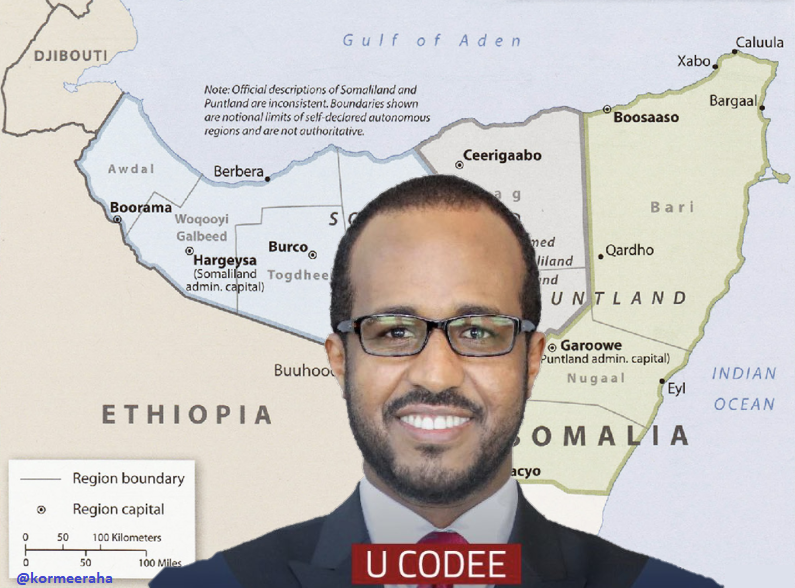
After weeks of an uphill battle, Gamal Hassan, the Somali Minister of Planning, saw his candidacy to represent his clan in the Federal Parliament blocked. The controversial announcement made yesterday by the Puntland Electoral Commission put an end to his re-election bid.
Puntland’s State Election Implementation Team (SEIT) has published the much expected list of candidates for Bosaso’s 16 parliamentary seats. His constituency has been “locked” for someone else in line with the forces against Gamal.
A risky campaign
Since he arrived in Bosaso, on February 16, to kick off his election campaign, attempts to show him that he should give up on his re-election have multiplied. In a clan-based electoral system where the clan chief must endorse the candidate, his “sultan” disappeared from Bosaso in order to not meet him.
On Saturday 19th, Gamal Hassan, who is one of the few effective ministers in Somalia, escaped a bomb attack that killed two traditional chiefs, Yasin Ali Dhahar and Abdisaid Abdi, and injured many others, including members of his campaign team, his security detail and notables from his clan.
Al-Shabab or Daesh-affiliated militants, usually quick to claim responsibility for their attacks and active in the region, this time remained silent. No other group behind this terror has come forward either.
Puntland President Said Abdullahi Deni, Gamal’s long-time antagonist, the man everyone suspects was behind the targeted killing, was further conspicuous by his silence for 24 hours after the attack and his absence at the elders funeral.
The day before, the notables who were assassinated had warned Deni’s administration to stop its actions aimed at harassing their candidates in these indirect elections whose clans should have the choice to present and elect their representatives.
A few hours before the attack, Gamal himself had given an interview making the same point about the obstacles aimed at preventing him from running or rigging the electoral process.
Amid these obstacles, we can mention the unusual disappearance of his clan leader, the isolated polling place, the supervision of a paramilitary force financed by the Emirates and now the direct attack on his live and his supporters’.
A bias endorsement process
His clan leader eventually returned to attend the slain elders’ funeral and appointed a team of 10 sub-clan elders to agree who will represent their clan in the Somali parliament. The vast majority chose Gamal but the Sultan sided with the only dissenting voice who wanted a close relative instead.
Appointing a team was already a sign that Sultan Mohamed Abdullahi Artan would do his utmost to prevent his candidacy. The man, a corrupt elder known for his ties with Said Deni, has the tendency to hide after the fact.
As long as there were forces in this Puntland’s Bari region united in opposing Deni’s aggressive and divisive stance in the region, many candidates in Deni’s cross hairs had a chance to exercise their right to run for election.
Their hope has been dashed when Deni met, generally separately, all elders from the Bari, Sool, Sanaag regions whose candidates run for the 16 seat in Bosaso.
The Puntland president also met Mohamud Osman Diyano, the Puntland Security Forces (PSF) director. Deni tried violently but unsuccessfully to remove Diyano from his post last December. Now, after two deadly skirmishes that destroyed properties and displaced many Bosaso residents, he offered him an olive branch to have his candidates elected.
Deni successfully negotiated his opponents’ candidacy be quashed and candidates in line with his views and supportive for him to run as the next president of Somalia.
On March 4, after the announcement that Diyano would remain at the head of the PSF, the list of approved candidates was released by the Puntland electoral committee. Gamal’s name was missing.
The promotion of mediocrity
Gamal Hassan is not the only high profile minister who had his re-election frustrated by a murky electoral process where bribery, divisive politics, foreign meddling and other petty considerations shadowed this election. Finance Minister Abdirahman Beyle lost his seat which he blamed on Prime Minister Mohamed Hussein Roble.
Gamal was a marked man for many dark forces dividing this nation and whose survival depends on defeating President Mohamed Abdullahi Farmajo. The minister is one of Farmajo’s staunch allies.
Being considerate, incorruptible and one of finest ministers for 5 years is not a badge of honour in this time in Somalia. It’s not what good he did that counts but who he’s loyal to. Said Deni, like a mafia boss, requires loyalty.
Gamal’s bid for re-election also set off opposition from Hargeisa. A week ago, a group of ministers from the self-declared republic of Somaliland reportedly called on Deni to do everything possible to prevent the minister from running again.
The minister, from the “disputed” region of Sanaag, had repeatedly angered Somaliland separatists for his categorical rejection of any secession. His unwavering approach to Somalia’s unity is a real concern to them all the more as he comes from the north. Other federalist figures from the northern regions have not been as outspoken as Gamal in their vision of a united Somalia.
In short, many forces have conspired to derail Gamal’s candidacy, but many hope that with this loss, the next government will not be staffed with mediocre or dubious patriotic officials.
